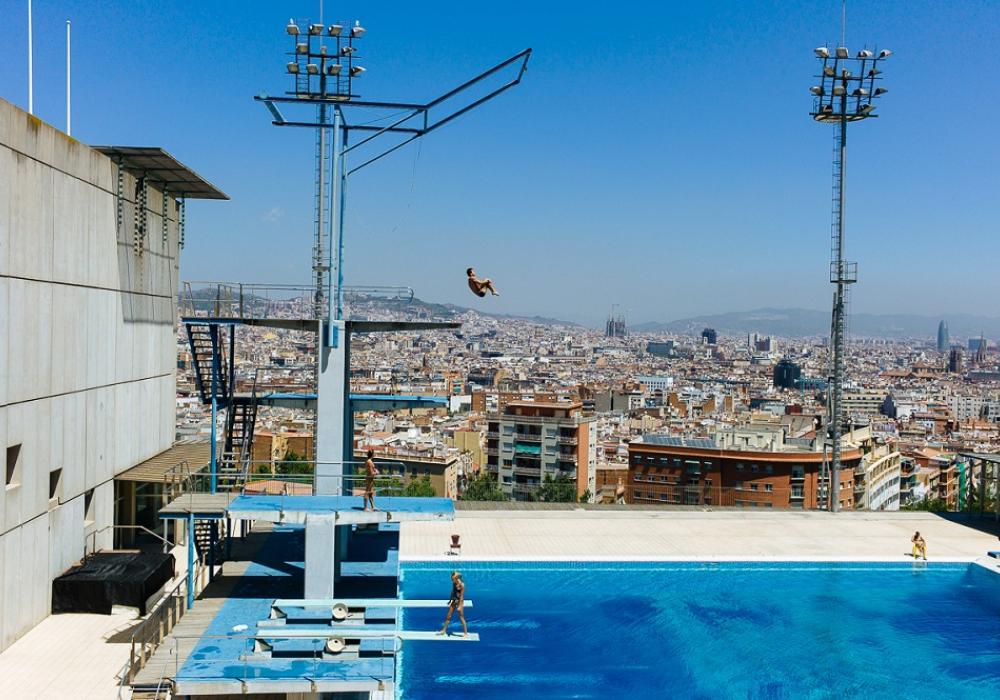This post originally appeared on The Citizen, Friday 12 August 2016
Some Olympic Games venues age better than others. Buffy Gorrilla reports on a unique project to document the life and times of former host cities.
* * *
In the summer of 2008, photographer Jon Pack was watching the Beijing Games with his Olympics-loving wife. He wondered what happens eventually to the buildings, stadiums and other purpose-built venues that impact a host city and the lives of its inhabitants. Pack started by exploring Olympic sites near New York City-Lake Placid (which hosted the Winter Games of 1980) and Montreal (Summer, 1976).
Pack showed some of his early images to photographer and documentary film maker Gary Hustwit, who convinced Pack that he should join his project to document the former Games sites(link is external). Hustwit, too, had become fascinated by how mega events, like the Olympics, could shape a city. It was an idea that he hadn’t had time to explore in his 2011 film Urbanized.
Hustwit describes it as “a little like an archaeology project”, delving into a city that has hosted a Games; “looking at these cities to see how the Olympic developments meshed with the city – or not – and how it affected the citizens of that city.”
Hustwit and Pack were recently in Turin, Italy to photograph the Winter Olympic village that had been abandoned for almost 10 years. Its venues and, in particular, the athletes’ housing demonstrated a lack of forward thinking, not even worthy of a bronze medal.
“They were built to last two weeks,” Hustwit explains. “They are practically made of cardboard. Which explains why [the city] couldn’t sell them or do anything with them after the Games.
“Squatters have started moving in, and African and Middle Eastern refugees; now, you have 1200 refugees occupying the Olympic Village.”
Before the 1972 Summer Games, Munich did not have a subway system. It was built for the Olympics and was a huge benefit for the city. Despite the harrowing terrorist attack that took place in the Olympic Village, Hustwit says that of the villages he has visited so far, Munich would be where he would most like to live.
“All the houses have green roofs; there are plants and grasses on roofs now. There are hundreds of houses and it looked like a cool place to live. Super vibrant, young people, bicycles.”
Of the 40 cities that have hosted an Olympics, some have used the Games to their advantage, making much-needed improvements with the investment that comes from winning an Olympic bid.
“Barcelona is a good example,” cites Hustwit. “They had been planning on making redevelopments to the city, but didn’t have the money to do it. When they got the Olympic Games, they used that money to do things the city needed. So when you look at it now, it is considered a success. It transformed the city and had a positive impact.”
Other cities — Atlanta, Montreal and Seoul — were also mindful of incorporating venues and facilities into the post-Olympic life of their communities.
People whom Hustwit and Pack met and interviewed through their tours of Olympic Villages shared stories about how the Games had impacted them. For many, the Games became part of their cultural identity and instilled a sense of pride. Cities, including Melbourne, Grenoble (France) and Moscow, turned their Olympic housing complexes over to public housing, which created a range of challenges for each.
The 1984 Games in Los Angeles were the turning point that led to today’s hypercompetitive city-versus-city bidding process. Then, Los Angeles and Tehran were the only cities vying to be host, but Tehran dropped out, leaving LA as the ‘winner’. When California turned the Olympic model on its head, using only existing infrastructure and venues, the city made millions of dollars, leading the world to believe the Olympics were a lucrative endeavour.
Some winning cities have gotten a mulligan at hosting the games: London, Los Angeles, Paris and Athens have each had an opportunity to improve their past performance. Tokyo will play host for a second summer Olympics in 2020 and, drawing on the Los Angeles experience, plan to reuse several of the venues from the 1964 event.
The results of the photographers’ exploration of past Olympic venues are contained in their book, The Olympic City(link is external).
“It’s an ongoing project,” says Hustwit. “As long as the Olympics continue, so can this project. Every two years it is a topic of conversation again — are the Olympics a good thing for cities?”
Complaints have already been voiced about venues and facilities in this year’s host city, Rio de Janeiro, where athletes’ beds were apparently too short for basketballers, and where unfinished buildings had left wires exposed and had toilets that didn’t flush. The Australian Olympic Team were staying in hotels until some of those teething problems had been resolved.
Hustwit is surprised cities don’t learn from the poor choices of the cities that have gone before them. “I don’t think Rio will be another Athens or Turin, but there will probably be some fallout afterwards,” he suggests. “They had this double whammy of the World Cup and now the Olympic Games very close together.
“There has been a lot of construction and whether those facilities are really needed, in an average year in Rio, is probably doubtful.”
Hustwit won’t be rushing to Rio after the Games. Letting an Olympic city get on with daily life is when they get better photographic results.
“I don’t even want to go to Rio for five years,” he says. “You can show up the day after and it’s like showing up after a big party, but it’s not a good representation of the long term impact.”





